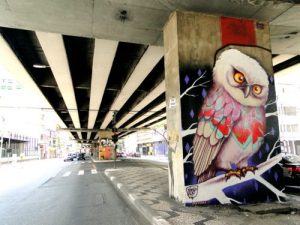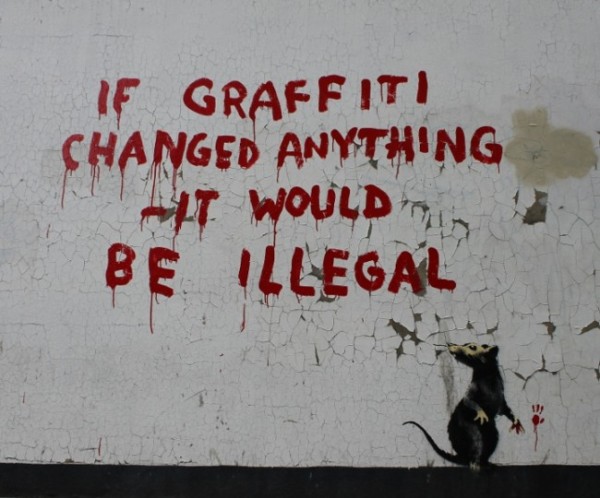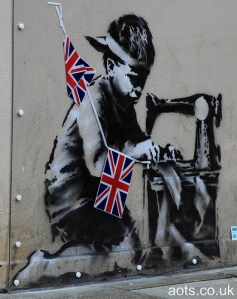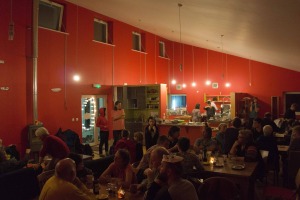 Paris has lots of graffiti. My friend Dan thinks it is no more than London. He also quite likes it. Mostly, I hate it; especially coming in to arrive at Gare du Nord.
Paris has lots of graffiti. My friend Dan thinks it is no more than London. He also quite likes it. Mostly, I hate it; especially coming in to arrive at Gare du Nord.
Annoying
To me, it is indicative of a rundown area. It makes the area look worse not better. Much of it is talentless and representative of rebellious people taking pleasure in annoying lots of other people. This is how I feel about it.
Occasionally I see graffiti that I find pleasing to look at. Often however, even this ‘good graffiti’ seems to be in an unsuitable location where it clashes with its context thereby rendering it still annoying. Extremely rarely, I see graffiti that looks great and suits its environment.
Subjective
All of this is my subjective view. Taste in art affords such opportunity for diversity I doubt that anybody agrees with me completely.
 But what do the graffiti artists think? I am certain that some of them have no interest in producing something aesthetically pleasing. People who aim to leave their tag in the most daring possible location are merely showing off. I have heard some of them say so in documentaries. Some are asserting their protest; rebelling against society, or the majority of society. Yet, others really seem passionate about producing something of great aesthetic worth; and, indeed, succeed.
But what do the graffiti artists think? I am certain that some of them have no interest in producing something aesthetically pleasing. People who aim to leave their tag in the most daring possible location are merely showing off. I have heard some of them say so in documentaries. Some are asserting their protest; rebelling against society, or the majority of society. Yet, others really seem passionate about producing something of great aesthetic worth; and, indeed, succeed.
According to Merriam-Webster graffiti is unauthorised writing or drawing on a public surface. The Collins definition suggests that graffiti is often obscene. This is not a positive view. Perhaps this is why young people tend to talk about ‘graff’ rather than graffiti to avoid these immediate negative connotations.
Democracy fails?
Dan talks as though the majority, who do not like graffiti, subjugate the minority who do. He has a point. It is more an evidence of the civilisation of a society how it treats its minorities than how much power is given to the majority. This notion raises a question mark over democracy, quite rightly.
Genocide
My colleague Steve, who sits next to me at work, used to live in Rwanda. That is the country where the majority ethnic group, the Hutus, murdered over eight hundred thousand of the minority ethnic group, the Tutsis, in 1994. This was roundly condemned worldwide as a genocide which left the United Nations’ Security Council looking horrifically inept. The current president of Rwanda, Paul Kagame, was not democratically elected. Steve tells me that if there were democratic elections, the Hutu majority would elect a Hutu president who would sanction further Hutu genocide of the Tutsis. Democracy, it seems, is not always the answer.
Understanding but not liberty
Graffiti artists, like Tutsis, deserve as much understanding as any other minority. The question is, how much liberty do we allow them? We do not allow child abusers to continue to offend on the basis that they are a minority that deserves protection. Some minorities, like thieves and murderers, though we seek treatment and rehabilitation for them, we nonetheless subject them to our justice system and quite rightly prohibit them from pursuit of their particular idiosyncrasy.
 So how should a society decide which minority deserves protection, which deserves impunity and which should be subject to justice? Extreme examples are simple. Ethnic minorities victimised by racists deserve protection while we lock up serial killers; but what about the more opaque examples? Should we really be imprisoning peace protesters who incorporate peaceful civil disobedience into their demonstrations? How much force is excessive when defending your own home against an intruder? What is the appropriate penalty for possession of cannabis? And returning to the main subject of this post, when is graffiti acceptable? Councils prosecute some graffiti artists whilst covering a Banksy with Perspex to protect it. These are examples of what I shall call borderline criminality.
So how should a society decide which minority deserves protection, which deserves impunity and which should be subject to justice? Extreme examples are simple. Ethnic minorities victimised by racists deserve protection while we lock up serial killers; but what about the more opaque examples? Should we really be imprisoning peace protesters who incorporate peaceful civil disobedience into their demonstrations? How much force is excessive when defending your own home against an intruder? What is the appropriate penalty for possession of cannabis? And returning to the main subject of this post, when is graffiti acceptable? Councils prosecute some graffiti artists whilst covering a Banksy with Perspex to protect it. These are examples of what I shall call borderline criminality.
Loo Circle
I saw a Banksy once. It was at Glastonbury Festival, near the stone circle. He was invited to put in his own installation. I would love to know how the Eavis family, the festival organisers, managed to contact him. This installation was a parody; a circle of Portaloos covered in graffiti. I was particularly amused by the bit that read “Ancient Pooins”.
Democracy is not perfect, as we have seen. But it is the best option. If we could find a truly righteous dictator, that would be my preference. But no such thing exists. Dictators throughout history have shown a propensity for feathering their own nests and suppressing their people. So we are stuck with democracy.
Rwanda’s racial hatred, currently obstructed by dictatorship, should actually be dealt with by international intervention. If an ethnic group really is so fixated with murderous intent towards its neighbours, then that group has to forego its right to self-determination. Pacifist intervention would be preferable, however, I cannot call for armies to be withheld from a situation where millions of deaths are inevitable.
Mix
Returning to the knotty problem of borderline criminality, we have to trust the democratic process, including all of its elements; a relatively free press, the right to protest, representation, debate and, indeed, government. It is the inclusion, within this mix, of protest and parliamentary representation, of every individual citizen, that ensures minorities are heard; and graffiti artists have a particularly effective form of protest at their disposal. Given this crucial stipulation of the complete mix, it is safe to say that statute should be relied upon to clarify the boundaries of acceptability.
In the case of graffiti, the law nearly succeeds. There are appropriate areas set aside for legitimate graffiti. I call for more of these. Artists can disregard the law in protest or as a gamble that their work will find popular approval. But if I find someone scrawling over the walls of my apartment, I can have them arrested. You see, I do not want even a Banksy beneath my bedroom window and I want to hang on to my right to choose. As for the Gare du Nord, I wish there could be more vigilance by officials, or, at least, the French graffiti artists could be a tad more imaginative.


















